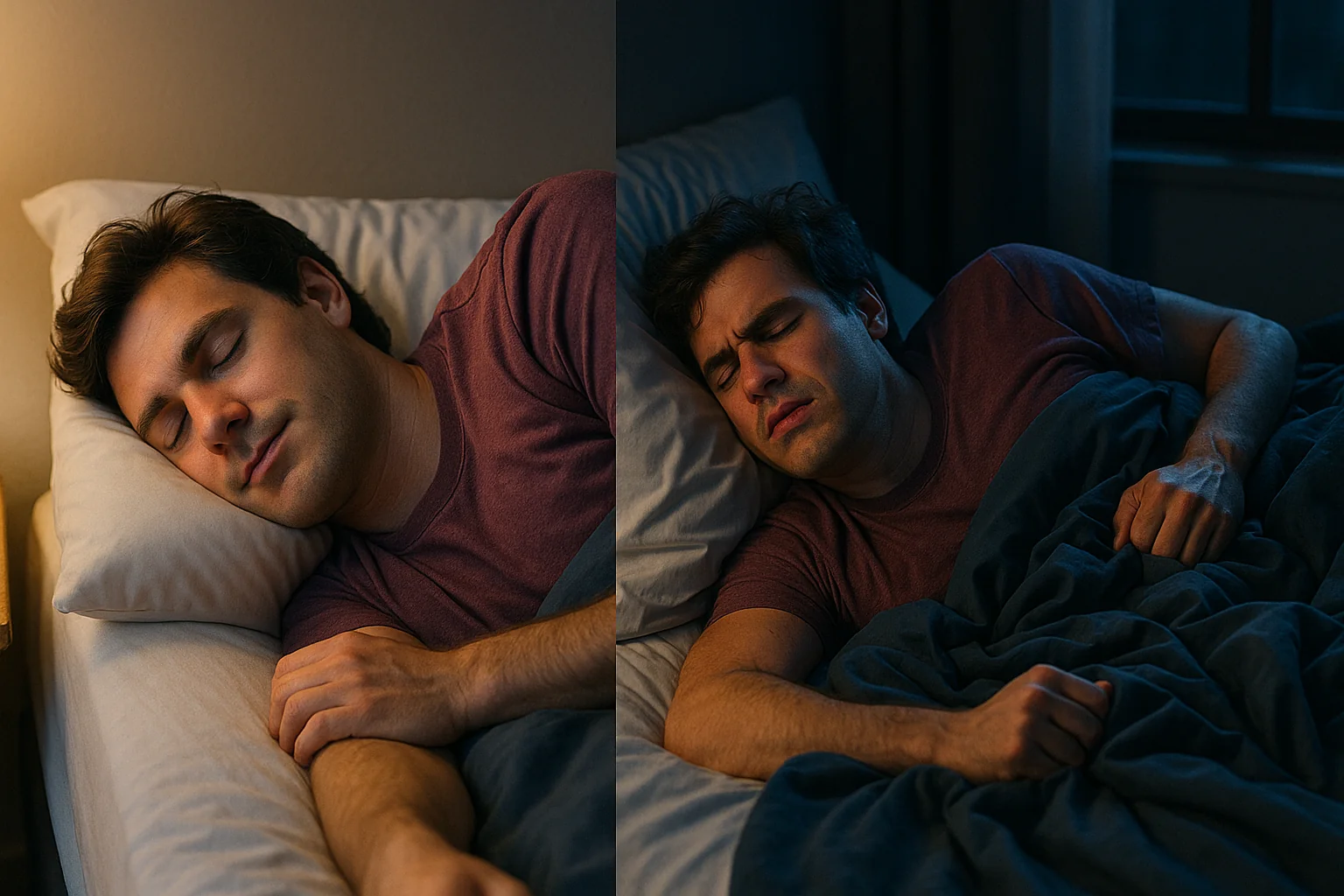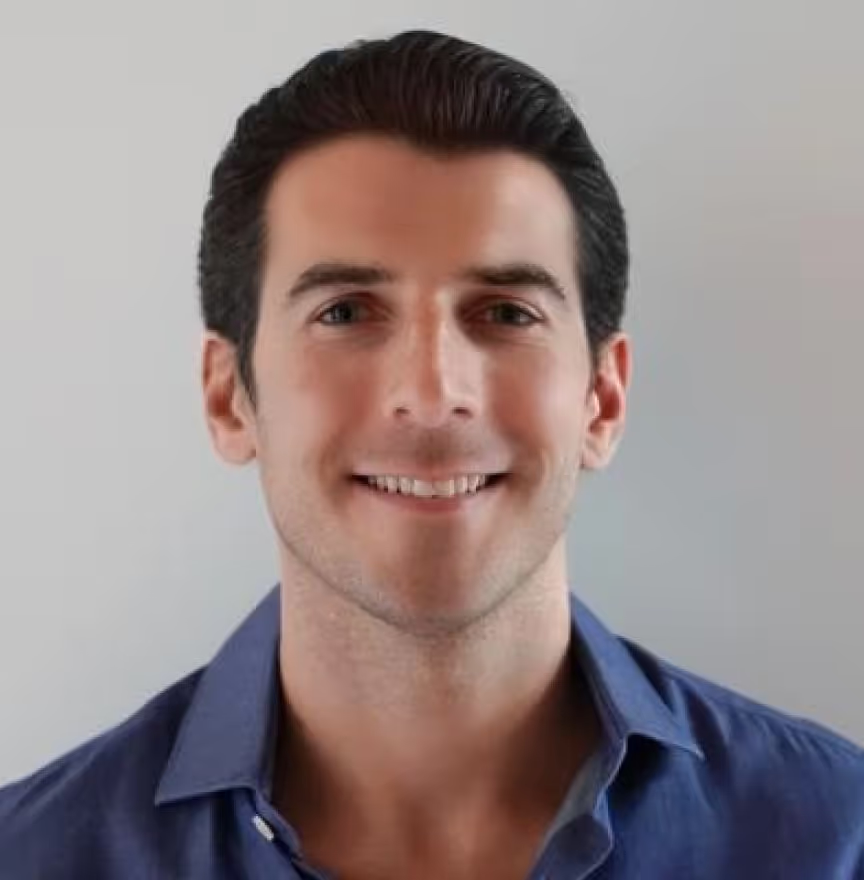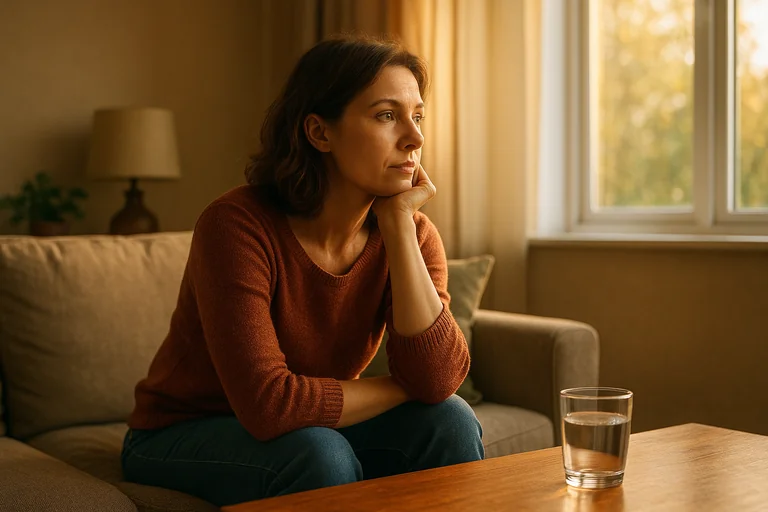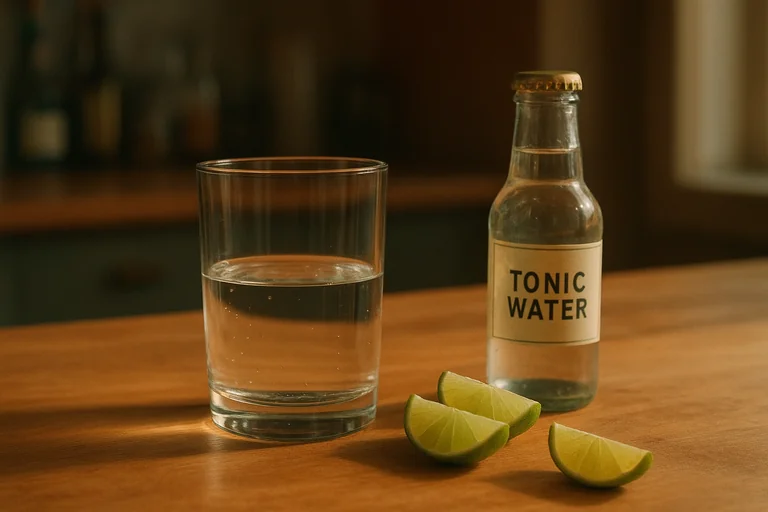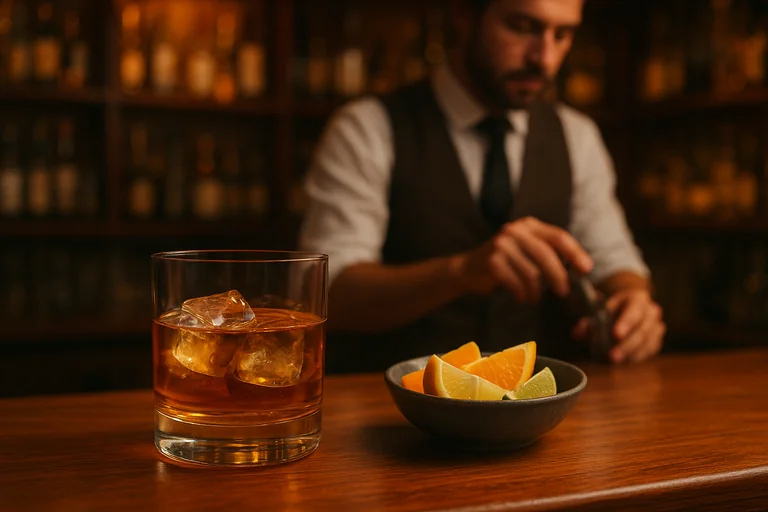A 2 minute assessment to get a personalized mental health or alcohol recovery plan.
Understanding how alcohol disrupts sleep architecture helps you recognize why you wake unrefreshed, even after "8 hours," and guides practical changes that restore quality rest.
What You'll Discover:
- Why alcohol makes you fall asleep faster but ruins sleep quality later in the night
- How alcohol suppresses REM sleep early, then causes rebound awakenings at 2 to 4 a.m.
- The connection between evening drinking and worsened snoring or sleep apnea
- How alcohol disrupts your body clock by suppressing melatonin production
- Practical strategies to sleep better if you drink, including timing and dose limits
- When to seek help for the nightcap-insomnia loop and treatment options that work
Alcohol front-loads sedation, you fall asleep faster, but back-loads disruption: early REM suppression followed by REM rebound, more awakenings, lighter sleep, and next-day fatigue and anxiety.
Evening alcohol worsens snoring and obstructive sleep apnea (OSA). Higher intake is linked to a roughly 25% increase in OSA risk, and it deepens oxygen drops in people who already have OSA.
All that said, a moderate evening dose can suppress melatonin 15 to 19% a few hours after drinking, nudging your body clock off schedule. And tolerance to alcohol's sedating effects develops rapidly, so "nightcaps" creep upward while sleep quality declines.
With that in mind, here's exactly how alcohol affects every stage of sleep, why even moderate drinking fragments your rest, and how to sleep better without relying on a pour-down ritual.
The big picture - why alcohol makes you sleepy, and then ruins your night
Alcohol is a central nervous system depressant. Early in the night it shortens sleep-onset latency and may briefly increase slow-wave sleep (SWS). But the trade you make is structural: alcohol suppresses REM in the first cycles, then as the body metabolizes it, the brain rebounds into lighter, choppier sleep with more awakenings and vivid dreams. The net effect, even after "7 to 8 hours in bed," is poorer sleep efficiency and worse next-day performance. Reviews of healthy sleepers consistently show this front-loaded sedation, back-loaded disruption pattern across dose ranges.
Two mechanisms drive the experience:
Adenosine and sleep pressure - Alcohol elevates extracellular adenosine and disrupts sleep homeostasis, so you feel drowsy early. As levels decline, that artificially boosted sleep pressure collapses, and you wake.
REM dynamics - Suppressed early REM builds "REM pressure," producing REM rebound later, intense dreams and micro-awakenings that slice up the second half of the night. This REM swing is also seen in heavy users and in withdrawal.
What alcohol does to a full night's sleep (timeline)
First hour after last drink - Faster sleep onset from sedation through GABAergic effects and adenosine buildup. REM suppression begins in the first cycle.
First half of the night - Sleep may feel "deep," but the architecture is skewed: less REM, sometimes a bit more SWS early. Airway muscles relax. Snoring often worsens and apneas are more likely.
Second half (as blood alcohol falls) - REM rebound leads to vivid dreams, frequent awakenings, lighter stages. Heart rate runs a little higher than baseline. Bathroom trips and dry mouth stack additional awakenings.
Morning - Sleep inertia, anxiety or irritability ("hangxiety"), brain fog, even when total time asleep looks adequate. In heavy patterns, disturbed sleep can persist into periods of abstinence.
Snoring and obstructive sleep apnea (OSA) - alcohol is an accelerator
Alcohol relaxes upper-airway muscles and raises the arousal threshold, so the brain responds more slowly to blocked breaths. A systematic review and meta-analysis found roughly 25% higher OSA risk in higher-intake groups versus none. In people who already have OSA, alcohol increases event frequency and deepens oxygen desaturations. Practical upshot: if you snore or wake unrefreshed, alcohol near bedtime will likely make problems worse.
What to do if you suspect OSA - Ask your clinician about home sleep testing. Treating OSA (CPAP, oral appliance, positional therapy) markedly improves sleep quality and daytime function. Alcohol's airway effects still argue for a firm 3 to 4-hour cut-off before bed.
Circadian timing - melatonin matters
Your body clock uses melatonin to organize sleep timing. A controlled study found that a moderate evening alcohol dose suppressed salivary melatonin by roughly 15 to 19% two to three hours after ingestion. That's enough to delay internal timing and degrade consolidation, especially if you also go to bed later after social events. Alcohol's circadian "static" layers on top of its architecture disruption.
Dose, timing, and pattern - what actually changes the impact
Dose - Higher doses mean stronger early sedation, greater REM suppression, and more severe second-half fragmentation. Even modest evening doses impair architecture in controlled studies.
Timing - The closer to bedtime you drink, the more the second half worsens. Moving the last drink earlier reduces (but doesn't eliminate) disruption.
Pattern - Binge patterns (rapid intake leading to high BAC) produce the steepest architecture swings and the worst next-day impairment. Repetition trains your brain toward tolerance, which pushes dose upward while sleep quality loops downward.
Beverage type? - For sleep, ethanol is the driver. Congeners may tweak hangover feel. They don't rescue architecture.
How alcohol interacts with stress, insomnia, and "hangxiety"
Alcohol is tempting when you're wound up. It can quiet racing thoughts and "knock you out." But the rebound unravels that benefit at 2 to 4 a.m., and the sleep debt that follows intensifies stress responsivity and anxiety the next day. Over time, many people slide into a nightcap-insomnia loop: poor sleep leads to evening drinking, which leads to worse sleep, which leads to more daytime fatigue and anxiety. The cycle repeats. Reviews show that tolerance to the sedating effect appears within nights, not months, and that alcohol interacts with prior sleep restriction to amplify next-day sleepiness and cognitive lapses.
In chronic heavy use and early recovery - special sleep issues
During heavy use - Decreased total sleep time, more awakenings, altered stage distribution (like persistent REM changes), and daytime sleepiness.
Withdrawal and early abstinence - Continued REM rebound, fragmented sleep, and vivid dreams for days to weeks. Poor sleep in early recovery predicts worse relapse risk, so treating sleep and alcohol use together matters.
If you've been drinking heavily for a long time, don't stop abruptly without medical advice. Withdrawal can be dangerous and sometimes needs supervised care as a short bridge to longer-term change.
How to sleep better if you drink at all - a practical, evidence-based plan
Move alcohol earlier and lower - Cut-off: finish drinks 3 to 4 hours before bed to reduce REM suppression and 3 a.m. wake-ups. Cap the dose: aim for 0 to 1 drink on routine nights, 1 to 2 max on social nights, never binge. Pace at 1 drink or less per hour and alternate with water.
Protect your body clock - Keep a fixed wake time seven days a week and get bright morning light. This builds natural sleep drive without a nightcap. Avoid stacking late meals plus late drinks. Both push your clock later. Alcohol's melatonin suppression adds drag.
Build a real wind-down (instead of a pour-down) - 30 to 45 minutes of dim light plus low arousal: warm shower, gentle stretching, reading, breathing drills, or a brief journal to offload mental noise. Bed equals sleep (and sex). Park scrolling and email elsewhere.
Snoring and OSA strategy - If there's snoring, witnessed apneas, morning headaches, or unrefreshing sleep (especially after drinking), get screened for OSA. Treating OSA plus earlier, lighter drinking is often a game-changer.
Fix the insomnia loop without alcohol - Consider CBT-I skills: stimulus control, time-in-bed restriction (with guidance), and cognitive tools for "tired-and-wired" nights. Reviews consistently advise against alcohol as a sleep aid because it magnifies fragmentation.
If reductions don't stick - That's not a willpower problem. Alcohol's reinforcement hits predictable windows (after work, post-conflict, travel). A clinician can map triggers, set limits, and align routines. For many adults who are medically appropriate, naltrexone oral tablets, paired with counseling, reduce heavy-drinking days and craving. Clinicians screen for contraindications (notably current opioid use or dependence and acute hepatitis or liver failure) and often check baseline liver tests. As heavy-drinking days fall, sleep continuity typically improves.
Special scenarios
Shift work and jet lag - Circadian misalignment plus alcohol is a two-hit combo. If you must shift your schedule, use timed light, consistent wake times, and strategic caffeine. Avoid alcohol as a "sledgehammer." It may help you doze off, but it destabilizes a clock you're trying to steer.
Perimenopause and midlife - Hot flashes, mood shifts, and rising OSA risk make midlife sleep fragile. Alcohol amplifies nocturnal awakenings and airway collapsibility. Many people notice outsized benefits from a firm evening cut-off or from skipping alcohol entirely on work nights.
Teens and young adults - Late chronotypes plus social patterns (pre-gaming, shots) produce late, heavy episodes, exactly the pattern that trashes the second half of the night and next-day learning. Emerging data in adolescents echo adult findings: dose-dependent REM disruption and wake after sleep onset after alcohol.
Myths and realities
"A small nightcap is harmless." - Even modest evening doses alter architecture (shorter sleep latency, less early REM, more second-half awakenings). If you choose to drink, keep it early, keep it light, and avoid stacking with late meals.
"Wine is better than whiskey for sleep." - For sleep, the ethanol matters most. Beverage congeners don't rescue architecture. Dose and timing do.
"If I don't snore, I'm fine." - Snoring and OSA is just one pathway. Alcohol's REM suppression and rebound, adenosine swing, and melatonin suppression degrade sleep for many people who never snore.
"I'll catch up tomorrow." - Alcohol interacts with sleep debt to amplify next-day sleepiness and cognitive lapses, even from one social night. Catch-up sleep rarely restores what fragmented architecture took.
"My tracker says I slept 8 hours, so I'm good." - Wearables estimate duration better than architecture. If you wake unrefreshed after drinking, believe your brain and behavior: performance, mood, and energy reflect quality, not just minutes.
What improvement looks like when you cut back
Within days - Fewer early-morning awakenings. Steadier mood and energy.
Within 1 to 3 weeks - More continuous sleep. Less snoring. Better workouts and focus.
In heavier patterns - Deeper normalization may take weeks as REM pressure and circadian timing stabilize. Staying the course pays off. Clinical and review data show disturbed sleep in heavy users can persist into early abstinence but improves with continued recovery.
A one-page playbook you can start tonight
- Cut-off: last drink 3 to 4 hours pre-bed
- Cap: 0 to 1 on routine nights, 1 to 2 max on social nights, never binge
- Pace: 1 drink or less per hour, alternate with water, avoid shots
- Anchor mornings: fixed wake time plus bright light, keep dinner earlier
- Wind-down: 30 to 45 minutes of low arousal, bed for sleep only
- Snoring plan: if you snore or wake unrefreshed, seek OSA testing, keep alcohol early even on therapy
- If cutting back doesn't stick: talk with a clinician about counseling and whether naltrexone oral tablets fit your goals and medical profile
Ready to sleep better and understand your drinking pattern?
Curious how much better you'd sleep if you changed your pattern? Our quick, confidential alcohol assessment gives you a private, research-based readout you can share with your clinician, plus a personalized sleep-first plan.
Start your 3-minute alcohol use assessment
